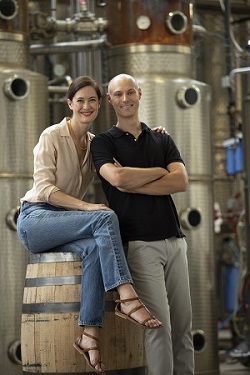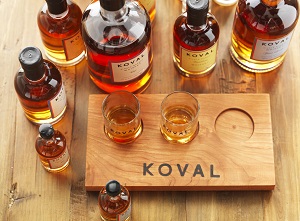History
KOVAL Distillery Co-Owner and President, Dr. Sonat Birnecker Hart, and her husband, Dr. Robert Birnecker, gave up their traditional careers to follow a different set of life goals; living in a city they loved, being close to family, working together, and making their own rules. Dr. Birnecker Hart wanted to run a business without checking motherhood at the door. Entrepreneurship offered her the opportunity to be close to her children even while she was at work. Her husband Robert comes from three generations of distillers, so the duo had the know-how and connections needed to start a successful business.
They opened KOVAL in 2008, making it the first distillery in Chicago since the mid-1800s. This posed some immediate challenges that affected initial growth. There were a number of outdated laws in Illinois, and Dr. Birnecker Hart had to go to Illinois’ state capital in Springfield to help get laws changed so that KOVAL could conduct tours, tastings, and even retail on site. All of these standard practices of today’s distilleries were illegal at the time.

Pioneering American Craft Style Whiskey
Unlike distillers who purchase or bottle premade spirits, KOVAL makes its organic spirits from scratch. The entire process for every product, including their well-known whiskey, is monitored from start to finish. Beyond this process geared toward exceptional quality, the two biggest points of differentiation for KOVAL are the use of alternative grain mashbills such as oat and millet, and the fact that they pioneered the new American craft style of using only the “heart cut” of the distillate. This style makes for a cleaner, brighter, and more grain-forward whiskey taste.
This “heart cut” technique is not only employed at their distillery, it’s something KOVAL has taught others through their Kothe workshops for aspiring distillers. After educating over 3,000 people in the art of distilling and setting up nearly 150 distilleries for others, the American craft style has grown more and more popular among craft distilleries who now follow the technique. It originated from KOVAL’s desire to apply a classic European fruit brandy approach, which Robert grew up with under his family’s distilling, to American spirits like whiskey. Traditional American whiskey tends to use the heart cut as well as some of the tails, whereas Austrian brandy producers would never use any tails. Dr. Birnecker Hart and Dr. Birnecker saw this as a good way to differentiate themselves in the industry.
The firm also believes in complete transparency about what’s in their bottles. At KOVAL, if something is labeled rye whiskey, it is made up of 100% rye. This is not always the case with other whiskey producers as the government allows a product to be called “rye” as long as it has just 51% rye. In addition, KOVAL never uses colorings and all their products are certified organic and kosher, meaning they’re able to trace the contents of each bottle back to the fields in which the grains were grown.
KOVAL has benefitted from a deepening interest in where and how products are made, a growing consumer preference that did not exist ten years ago. As people hold companies more accountable and seek out interesting, quality, and socially responsible brands they can really get behind, more and more are turning to KOVAL Distillery. They believe in making amazing products, but also value being contributors to their community beyond the product. “In our minds, being community focused is an essential ingredient of the overall ‘spirit of KOVAL,’” said Dr. Birnecker Hart.

The Spirit of KOVAL
KOVAL works collaboratively with other Chicago brands and tries to celebrate their love of Chicago at every turn. They also work to engage in a variety of charitable events as well as more straightforward whiskey and gin festivals and industry events. Regardless of where KOVAL exists in the world, be it Japan or the U.S., they work to present themselves in the same light – focused on quality, transparency, and community.
For employees, the spirit of KOVAL means focusing on continual development and opportunity. Several of the firm’s team members have taken classes to broaden their skill sets and enrichment. They recruit new talent through the networks of current employees, the local chambers of commerce, collaborators, industry referrals, and online job boards.
Current Challenges and Focus for the Future
There are a number of challenges facing craft liquor brands at the moment, not least of which is a looming tariff increase and the loss of revenue due to COVID closings of tasting rooms and tours. “I would also say that the shift toward e-commerce is a huge challenge for craft brands, as it often involves significant marketing spend just to be listed for sale on certain websites. In fact, the shift to online retail relies greatly on marketing spend and oversight to properly reach consumers. It can be both very expensive and labor intensive, particularly in a year filled with challenges,” explained Dr. Birnecker Hart.
KOVAL has adapted to this changing landscape in stride. In March 2020, the distiller shifted from making spirits to making hand sanitizer that they then donated to a variety of community organizations, frontline workers, medical communities, and non-profits, in addition to selling to businesses and individual households. The pandemic also gave KOVAL impetus to examine all of the things they needed to do to find other avenues for revenue and strengthen the business for the future.
They’re looking forward to opening the bar and patio and restarting distillery tours after over a year of being closed to the public. KOVAL is also moving full steam ahead into new markets in the US and abroad while continuing to focus on expansion within their current markets. This examination, which took place during the pandemic shutdowns, is helping the firm move forward with a thoughtful and targeted approach.
When asked what advice she may have for other middle market leaders, Dr. Birnecker Hart said, “I am a huge proponent for international trade. It has been a fabulous way for us to grow our business and build an international brand. Every state has a number of programs to help businesses export, and the federal government also has programs for assisting with sales and marketing activities abroad. Everyone should consider international trade, as it is well worth the effort.”
